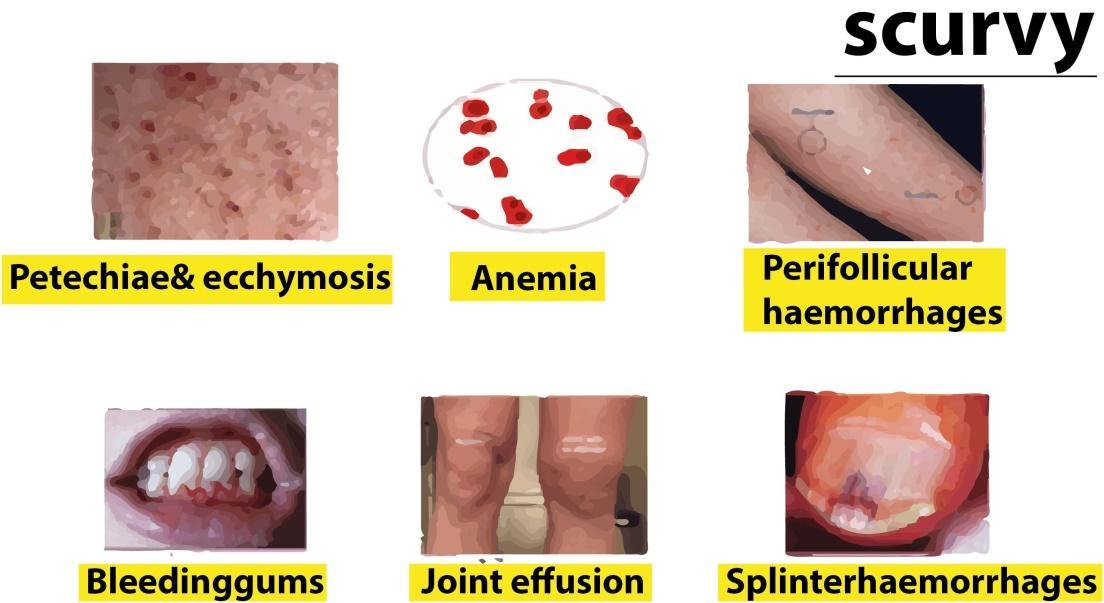
In the 16th century, sailors who traveled long distances had diseases related to malnutrition because they were not able to eat fresh vegetables and fruits for months at a time. Scurvy is the result of a deficiency of
(a) Carbohydrates
(b) Proteins
(c) Vitamin C
(d) Vitamin D
Answer
587.7k+ views
Hint: We need different types of substances like proteins, carbohydrates, fats, minerals, vitamins, etc for our healthy growth and development. Each molecule has a specific job in our body. So, the lack of any substances can lead to different diseases.
Complete answer:
Among all the essential needs vitamin is one of those substances that our body needs to grow and develop normally. We can usually get all your vitamins from the foods we eat. Each vitamin has a specific job in our body. We can face health problems if we have low levels of certain vitamins in our body.
Scurvy is one of such kinds of disease which happens due to vitamin C deficiency. It can lead to different health issues like anemia, debility, exhaustion, spontaneous bleeding, pain in the limbs, and especially the legs, swelling in some parts of the body, and sometimes loss of teeth and ulceration of the gums.

So, the correct answer is, ‘(c) Vitamin C’.
Additional Information:
1) There are 13 vitamins your body needs. They are- Vitamin A, B vitamins (thiamine, riboflavin, niacin, pantothenic acid, biotin, vitamin B-6, vitamin B-12, and folate) , Vitamin C, Vitamin D, Vitamin E, Vitamin K.
2) Scurvy has been known since ancient Greek and Egyptian times. It is often seen in the case of sailors in the 15th to 18th centuries when long sea voyages made it hard to get a steady supply of fresh produce. Many died from the effects.
3) It also occurred during the Irish potato famine in 1845 and the American Civil War. The most recent documented outbreak was in Afghanistan in 2002, following the war and drought.
Note: By consuming enough vitamin C this issue can be prevented, preferably in the diet, but sometimes as a supplement. A complete recovery is possible but also can be fatal if left untreated. It shows long-term effects unlikely, except in the case of severe dental damage.
Complete answer:
Among all the essential needs vitamin is one of those substances that our body needs to grow and develop normally. We can usually get all your vitamins from the foods we eat. Each vitamin has a specific job in our body. We can face health problems if we have low levels of certain vitamins in our body.
Scurvy is one of such kinds of disease which happens due to vitamin C deficiency. It can lead to different health issues like anemia, debility, exhaustion, spontaneous bleeding, pain in the limbs, and especially the legs, swelling in some parts of the body, and sometimes loss of teeth and ulceration of the gums.

So, the correct answer is, ‘(c) Vitamin C’.
Additional Information:
1) There are 13 vitamins your body needs. They are- Vitamin A, B vitamins (thiamine, riboflavin, niacin, pantothenic acid, biotin, vitamin B-6, vitamin B-12, and folate) , Vitamin C, Vitamin D, Vitamin E, Vitamin K.
2) Scurvy has been known since ancient Greek and Egyptian times. It is often seen in the case of sailors in the 15th to 18th centuries when long sea voyages made it hard to get a steady supply of fresh produce. Many died from the effects.
3) It also occurred during the Irish potato famine in 1845 and the American Civil War. The most recent documented outbreak was in Afghanistan in 2002, following the war and drought.
Note: By consuming enough vitamin C this issue can be prevented, preferably in the diet, but sometimes as a supplement. A complete recovery is possible but also can be fatal if left untreated. It shows long-term effects unlikely, except in the case of severe dental damage.
Recently Updated Pages
Master Class 11 Computer Science: Engaging Questions & Answers for Success

Master Class 11 Business Studies: Engaging Questions & Answers for Success

Master Class 11 Economics: Engaging Questions & Answers for Success

Master Class 11 English: Engaging Questions & Answers for Success

Master Class 11 Maths: Engaging Questions & Answers for Success

Master Class 11 Biology: Engaging Questions & Answers for Success

Trending doubts
One Metric ton is equal to kg A 10000 B 1000 C 100 class 11 physics CBSE

There are 720 permutations of the digits 1 2 3 4 5 class 11 maths CBSE

Discuss the various forms of bacteria class 11 biology CBSE

Draw a diagram of a plant cell and label at least eight class 11 biology CBSE

State the laws of reflection of light

Explain zero factorial class 11 maths CBSE




